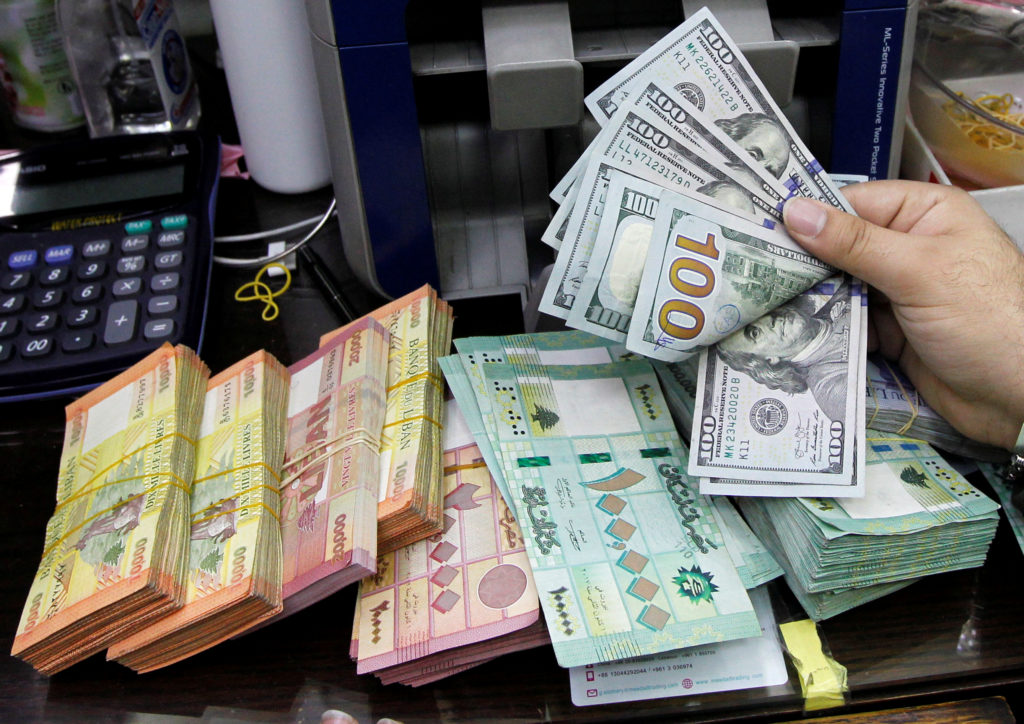
FILE PHOTO: A man counts U.S. dollar banknotes next to Lebanese pounds at a currency exchange shop in Beirut, Lebanon April 24, 2020. REUTERS/Mohamed Azakir/File Photo
About 48 hours after President Bola Tinubu and Acting Governor of the Central Bank of Nigeria (CBN), Folashodun Shonubi, held a crucial meeting on the state of the foreign exchange (FX) market, there is a breather for the naira as it recorded a moderate gain trading at about N880/$ at the black market yesterday.
Dollar spiked last week hitting an all-time high of N950/$ at peer-to-peer (P2P) and parallel market amid fresh concern over scarcity.
Banks and traders face unusual scarcity, leaving many end users, including businesses stranded.
But the naira started firming up on Tuesday following reports that the CBN boss met with the President during which he vowed to go aftermarket speculators.
Yesterday, the street market opened at over N900/$ but the greenback buckled towards evening, trading around N880/$ band.
As of press time, the dollar was trading at N877/$ on Binance and other P2P platforms, which mirrors the market.
Notwithstanding the ease, bankers and black-market traders are still grappling with usual illiquidity.
A top executive of a dairy company said yesterday that the company has been struggling to source foreign exchange to conclude a transaction that commenced over three months ago.
“While the official requests filed in tranches are stalled, supply is scanty. This is not even about the rate; if you are desperate, you would want to pay a premium. But the so-called black market is extremely shallow,” the executive who is not authorized to speak on the issue said.
A dealer also explained that trading volume has been extremely low with only very few people selling while requests from end users remain upbeat.
At the onset of the rates harmonisation, we reported most banks had halted processing requests for personal/business travel allowance (B/PTA).
On Monday, a top banker revealed that the situation remained closely the same except that supply has increased slightly.
“But the increase in supply is still insignificant when compared with the high demand. Perhaps, the situation will improve in the coming months. But how do you ask a business that needs funding today to wait for months?” the banker asked.
In many bank branches, FX desks are almost non-existence.
Last week, the Central Bank of Nigeria (CBN) threatened to sanction commercial banks that engage in illegal sales of foreign exchange deals.
Whereas bank officials claim they do not have sufficient supply, hence they cannot meet the end-user’s demand, there are claims that bankers are actively diverting FX to black market dealers.
Delivering a lecture titled, ‘Diaspora Remittances and Nigerian Economic Development, in Abuja, Shonubi warned that “we need to name and shame commercial banks involved in such malpractices.”
Findings suggest that an increasing number of bankers are involved in FX as a ‘side hustle’. A source privy to the trend said the activity is seriously affecting transactions that would have officially been routed through the official market.
The rising sharp practices have left many overseas students, who are forced to source FX at black market rates, in limbo. Two parents who are struggling to source money for tuition said they would cough out about 100 per cent above what they paid last year owing to the sharp fall in the value of naira.
Meanwhile, Senior Market Analyst at FXTM, Lukman Otunuga, has warned that should the current negative themes continue, the exchange rate may fall to N1000 per dollar in a matter of time.
According to him, such a development will most likely increase the cost of living and squeeze households further in the short to medium term.
He stated that inflationary pressures are gradually easing across the globe, but remain high in Nigeria.
Otunuga said unlike the United States, where inflation has slowed from 9.1 per cent to 3.2 per cent in about a year, Nigeria’s price index has remained hot, stubborn, and unyielding.
“Ultimately, persistent signs of rising inflation may force the Central Bank of Nigeria to act once again at its next policy meeting in September. It is worth keeping in mind that the Central Bank of Nigeria (CBN) has recently lifted its benchmark rates by 25bp to 18.75 per cent – its fourth consecutive rate hike in 2023.
“While higher rates have the potential to cap and control inflation, it could come at the cost of economic growth which expanded by 2.31 percent during the first quarter of 2023,” he said.






